Atlas Cedarwood Essential Oil Benefits, Uses, and Blends
Scientific Name: Cedrus Atlantica
Origin: Morocco
Plant Part: Wood
Scent: Soft, woody, earthy, warming, and masculine.
Color: Clear to light brown
Consistency: Thin
Perfumery Note: Top note, but acts like a base note fixative
Initial Aroma Strength: Soft, ephemeral
Extraction Method: Steam Distillation
Atlas Cedarwood Essential Oil blends well with
Spices, flowers, resins, and other woods.
Atlas Cedarwood Essential Oil Uses:
- Bronchial
- Urinary tract infections and problems
- Cystitis and urinary tract infections
- Breaks down mucus
- Mildly astringent
- Acne – in particular in males (masculine fragrance so good for skin care)
- Dandruff
- Tonic for the entire body
- Regulates menstruation.
- Reduces stress and tension
Where Does Our Atlas Cedarwood Essential Oil Come From?
Beautiful Cedarwood Atlas, the finest and the original Cedarwood Oil. Ours comes from the Atlas Mountains in Morocco. Known among the locals as ‘Idraren Draren’ (Mountains of Mountains), the Atlas Mountains in the Maghreb are North Africa’s highest mountain range. The range separates the Sahara Desert from the Mediterranean Sea and the Atlantic Ocean, which takes its name from the mountain range. It stretches around 2,500 km (1,600 mi) through Morocco, Algeria, and Tunisia. Currently, Morocco has the highest total surface of Atlas cedar in the world. The vast cedar forests thrive in the country’s humidity.
History of Cedarwood Essential Oil
Cedars grow tall and very straight. Likewise, they are extremely water-resistant, and they have insect-repellent properties. As such, cedarwood has also always been a well-sought-after material for construction and shipbuilding.
Consider too that insects, water, and mold might be considered negative entities. As such, cedarwood became an integral part of ancient religions. In some temples, splinters are left behind on the door jambs. That they remain there today is a testament to cedar’s tremendous ability to stand the rigors of four thousand years of weather and several hundred generations of destructive insects.
Cedarwood was used to build ships, and even it was said, the solar bark, the boat the pharaoh sailed in through the night to meet the sun god Ra.
Egypt does not have many (if any) indigenous tall trees - most are grubby, so thousands of tons of cedarwood were shipped to ancient Egypt each year. In their case, it came from Lebanon, and the cedars of Lebanon became famous throughout the ancient world. Sadly, climate change has all but killed the Cedars in Lebanon. Only 17 square kilometers of scattered groves of Cedars remain. The country's most famous cedar grove, often referred to as the Cedars of God, has been fenced off to protect it since 1876. Twenty years ago, the Cedars of God gained UNESCO World Heritage status.
Atlas Cedarwood Essential Oil Comes From An Endangered Species
Conservationist, Kelly Ablard, of the Airmid Institute, writes:
“ The conservation status of Atlas cedar (C. atlantica) is never noted in profiles [before 2013 ], because there was no conservation status for this species until 1998, when it was then categorized as a species of Least Concern, meaning the risk of its extinction was low (IUCN, 2017). Unfortunately, in 2013, just 15 years later, new data revealed that it is endangered (Thomas, 2013; IUCN, 2017).
A species is deemed endangered when natural population numbers decrease ≥50% over 10 years or 3 generations, assessments of wild and mature adults total less than 250,0, and the numbers are declining, and there is a 20% probability of its extinction within 20 years or 5 generations (IUCN, 2017).” (Ablard, 2017)
The problem of endangerment is complex here. This is a high-demand wood that is very slow-growing. Replacing used trees with new saplings is a worthy but slow solution that will take time to see rewards.
It is possible to ethically source atlas cedarwood, however. Small runs are distilled from wood shavings, byproducts of other construction projects, and cedarwood.
Nevertheless, Atlas Cedarwood Essential Oil should be used sparingly. We also stock Texas and Himalayan cedarwoods, which are deemed to be of less concern and may be more appropriate for general usage.
Atlas Cedarwood Essential Oil for the Nervous System
That Atlas Cedarwood seems to chase away negative energies is a timeless feeling. Even today, an aromatherapist will recommend it when someone is suffering from intrusive negative thoughts. It is especially lovely blended with orange Essential Oil, then, because apart from them smelling amazing together, orange Essential Oil bursts with positivity.
It has profound sedative effects. (Kagawa, 2003)
Atlas Cedarwood Essential Oil for Stress and Anxiety
Inhalation of cedrol, one of the main chemical constituents of Atlas cedarwood essential is proven to reduce sympathetic nervous activity (Diawasna, 2003), which i the action of the nervous system when we are stressed.
To switch the sympathetic nervous system down, the parasympathetic nervous system needs to take over to help the body rest and restore. Cedarwood induces activity in the parasympathetic nervous system. (Diawasna, 2003)
These effects were tested as an idea to help in an old people’s home around people who had dementia. They used diffusers and spray bottles to see if Cedarwood Essential Oil made a difference in their demeanor. This is important work, because not only does it soothe and improve the quality of the patient, but also for the caregiver.
The study saw improvements in agitation, anxiety, and irritability.
It should be stressed that whilst this offers extremely important therapeutic possibilities to many families with dementia, it has its limitations. For many people, the first clues of neurodegeneration are a loss of olfactory neurons. These sprays and diffusers offer little help for people suffering from smell loss; however, topical use of atlas cedarwood Essential Oil could still be a good option. (Takahashi, 2020)
That said, other trials suggest that the sedative effects of atlas cedarwood Essential Oil may not be entirely linked to olfaction (Kagawa, 2003)
Atlas Cedarwood Essential Oil for Skin
All cedarwood Essential Oils are great for skin care; there is no need to specifically go for atlas cedarwood Essential Oil for this one.
Specifically, cedarwood oils are great for skin that is reactive and sensitive. They are a great choice for men’s skin in particular because they have a less flowery fragrance than many of the other skin care oils.
It’s a great choice for aftershave balms and beard oils.
Atlas cedarwood can be a great boon for acne, helping to balance greasiness and cleansing the skin with its antibacterial actions. (Hassoun, 2016)
Atlas Cedarwood Essential Oil for Hair Growth
Cedarwood Essential Oil is a traditional treatment for hair growth, helping to make the hair thick and lustrous and reputedly protecting against baldness.
This was tested in a study done in 1998 when eighty-six people with alopecia were asked to massage their heads daily with a Grapeseed Carrier Oil for seven months. Half of those were given a more complex blend of Thyme, Rosemary, Lavender, and Cedarwood, also blended into the grapeseed and some Jojoba Oils.
The effects were appraised after three months and at the end of seven months.
Improvements were found in six people in the control group, as compared with nineteen of the people in the Cedarwood and Essential Oils group reported improvements. (Hay, 1998)
Again, this applies to all kinds of cedarwood Essential Oils.
Atlas Cedarwood Essential Oil for The Gut
Traditional medicine often cites cedarwood Essential Oil for digestive problems.
For many people, these digestive issues may be derived from a bacterium called Helicobacter pylori, which can cause sores and inflammation in the lining of your stomach or the upper part of your small intestine. (the duodenum)
- Pylori infections are common. About two-thirds of the world’s population has it in their bodies, and for most people, it causes no problems. However, it is the most common cause underlying peptic ulcers. Other symptoms include stomach aches, especially when you have not eaten, nausea, burping, bloating, and loss of appetite.
Atlas cedarwood Essential Oil is proven to be active against Helicobacter pylori. (Korona Glowniak, 2020)
Atlas Cedarwood Essential Oil and Pain
The endocannabinoid system is our primary endocrine system. Its job is to modulate signaling throughout many of our bodily systems, including our nervous system.
It is primarily made up of two types of receptors that are spread throughout the body. CB1 receptors are found in the spinal cord and the brain. CB2 receptors are mostly found on blood and lymphatic tissue of the periphery (Periphery = outside of the brain and spinal cord).
CB1 receptors modulate appetite, memory, pain, nausea, cognition, mood, and itching.
CB2 receptors modulate inflammation, immunity, and pain.
These work via post-synaptic signaling. That is when messages are sent from one nerve to another; the message has to pass over a gap between them. To traverse this, neurotransmitters are dispatched between the presynaptic nerve (the one before the gap) to the postsynaptic nerve (the one after.
Endocannabinoid signaling is retrograde. It sends messages backward to report that the neurotransmitters have been received and gives perpetual inventory on levels. Thus, we expect to see “We need more” or “We need less” when the endocannabinoid system works correctly.
Hence, when the endocannabinoid system does not work effectively, we see all manner of things going wrong, including emotional problems and pain.
A 2018 rodent study examined the effects of inhaled atlas cedarwood Essential Oil on pain. It was shown that the profound analgesic effects came from the fact that atlas cedarwood engaged both CB1 and CB2 receptors.
The Insect Repellent Properties of Atlas Cedarwood Essential Oil
How Does Atlas Cedarwood Essential Oil Repel Critters and Beasties?
Allelopathy is a common biological phenomenon where an organism manufactures chemicals to influence the development, reproduction, and survival of another. Allelochemicals target other organisms in beneficial or destructive ways, for pollination, for example, or to prevent germination of other species. Humans exploit the incredible effects of these hormones and secondary metabolites by distilling them to make Essential Oils.
Moth Repellent Properties of Atlas Cedarwood Essential Oil
Try telling your mother that cedarwood repels insects, and she’ll likely roll her eyes and say “Obviously”. Her mother probably used clothes hangers, little wooden drawer balls, and even cedarwood chests in the hope of guarding against insects.
The case-making moth and webbing moth are often unfairly blamed for holes in sweaters, which are more likely caused by carpet beetles, probably way more destructive than moths.
Three beetle species are known to feed on tapestries and fabrics. The adults themselves are not problematic, but they lay eggs that develop into ravenously hungry larvae. Cedrol will continue to kill newly hatched or young larvae as long as a cedar chest or closet is kept closed tightly enough to confine the volatiles.
Guess what the walls of rooms where Turkish carpet merchants display their wares are made of. What’s more, they have been, since way before the conventions of microscopes betrayed the cedarwood secret.
Atlas Cedarwood Essential Oil Will Repel Termites
For the most part, termites, one of the Earth’s most destructive species, stayed away from temple doors. Even long after the bricks had fallen, the soil’s clean-up crew refrained from recycling the wood into compost because of repellent allelochemicals the wood secreted.
Now, to be clear, termites won’t always be deterred from cedar. That might be down to the part of the wood chosen by the carpenter. Allelochemicals are usually made at the very heartwood of the tree, and so planks taken from further out may have weaker concentrations. (Another reason to add to the endangered species problem - not all of the wood is always useful.)
Mosquito Repellent Properties of Atlas Cedarwood Essential Oil
Cedarwoods are repellent to several types of mosquitoes, in particular Anopheles Stephens, one of the primary vectors of malaria. (Curtis,1987)
Cedrene and cedrol, primary isolates from cedar species, interrupt the reproductive cycles of the Peanut Trash Bug (Elasmolomus solidus), the Forage Mite (Tyrophagus putrescentiae), and the Indian Meal Moth. (Plodia Interpunctella) (Sabine, 1975)
Note that Cedrene and Cedrol are found in all Cedars, not just Atlas Cedarwood Essential Oil.
Anti-Parasitic Properties of Atlas Cedarwood Essential Oil
It has an extraordinary effect on Schistosoma mansoni, a water-borne blood fluke found in the Middle East, the Caribbean, Brazil, Venezuela, and Suriname.
Never heard of it?
'You'd better hope you never will either! This little monster burrows in through human skin and travels along the blood highways to take up residency in the small intestine.
That might not be so bad if it weren’t such a problematic houseguest. However, over time, it blocks tissues and clogs the liver, and the resulting disease, schistosomiasis, is often partnered alongside hepatitis.
In 2021, the WHO reported 236.6 million people living with the parasite.
What about this? It’s like a horror story! Truly, you couldn’t make it up.
Cercariae are free-swimming parasite larvae, happily living in rivers and waterways, patiently waiting for new human hosts. When it finds one, it bores through the skin, and well, you know the rest of that disgusting tale.
Or, maybe you don’t, because the success of our heroic swimmer relies on finding lipids (fats) that have similar viscosity and pressure to ensure as seamless a house move as possible. In 1992, it was proven that cedrol disrupts lipid pressures, making the human environment toxic to the parasite. (Naples, 1992)
Atlas Cedarwood Essential Oil Disturbs Mice
It has a non-hypnotic effect on mice. These destructive rodents are less likely to make nests in cedarwood because they struggle to fall asleep when near it. (Opdyke 1974)
Lizards Won’t Appreciate Your Atlas Cedarwood Essential Oil Either
If you put cedarwood shavings into a lizard’s cage, it will move to the other side, refusing to go near it. Some cedars are both harmful to their skin as well as confusing their nervous systems. Interacting with the GABA receptors, they can cause seizures in non-mammalian species.
After all that, it should be noted that Himalayan and Texas cedarwood Essential Oils are shown to have the same degree of insecticide and pest-controlling abilities. From an ethical point of view, it makes sense to use one of the most sustainable sources of cedarwood for these and to save Atlas cedarwood Essential Oil for more specialized therapy, like for emotional support and pain.
Atlas Cedarwood Essential Oil Blending Notes
Cedarwood has a warm, sweet woody aroma. In perfumery, it is noted as a Base Note, meaning that the aroma brings some depth and leaves a lingering, lasting note when used. It blends well with so many other oils, which is ggreat but it can be overwhelming when starting with mixing oils. Cedarwood can elevate any blend to new horizons, offering a sense of connection to yourself and your community.
DIY Atlas Cedarwood Essential Oil Blends
Atlas Cedarwood Essential Oil Recipe for Digestive Issues
- 1 Teaspoon Grapeseed Carrier Oil (Vitis Vinifera)
- 5 drops Atlas Cedarwood Essential Oil (Cedrus Atlantica)
- 3 drops Oregano Essential Oil (Oregano Majorana)
- 3 drops Roman Chamomile Essential Oil (Anthemis Nobilis)
Method of use: Massage the full amount into the abdomen and back twice a day for two weeks.
Safety: Not suitable for use during pregnancy. Not suitable for use if you are taking blood-thinning medications or have a platelet-clotting disorder (oregano). Do not use it if you have bleeding peptic ulcers.
Atlas Cedarwood Essential Oil Recipe for Hair Loss
- 50 ml Grapeseed Carrier Oil (Vitis Vinifera)
- 50 ml Jojoba Carrier Oil (Simmondsia Chinensis)
- 30 drops Atlas Cedarwood Essential Oil (Cedrus Atlantica)
- 20 drops Rosemary Essential Oil (Salvia Rosmarinus)
- 30 drops Red Thyme Essential Oil (Thymus Vulgaris)
- 30 drops Lavender Essential Oil (Lavandula Angustifolia)
Method of Use: Massage the scalp daily with the blend.
Safety: Not suitable during the first 16 weeks of pregnancy. Use with care in cases of high blood pressure, epilepsy, or any kind of delusory condition such as psychosis or schizophrenia. (Rosemary)
Conclusion
Atlas cedarwood Essential Oil is beautiful for skin care and for emotional support, particularly. It is great to add to hair care regimes and for pain. Although our atlas cedarwood Essential Oil is sourced ethically, with sustainable manufacturing processes, it is always worth stressing that it is a treasured oil. Consider also buying a bottle of Himalayan or Texan cedarwood for insect repellent uses, etc.

- Reviews
- Questions


You may also like
Recently viewed



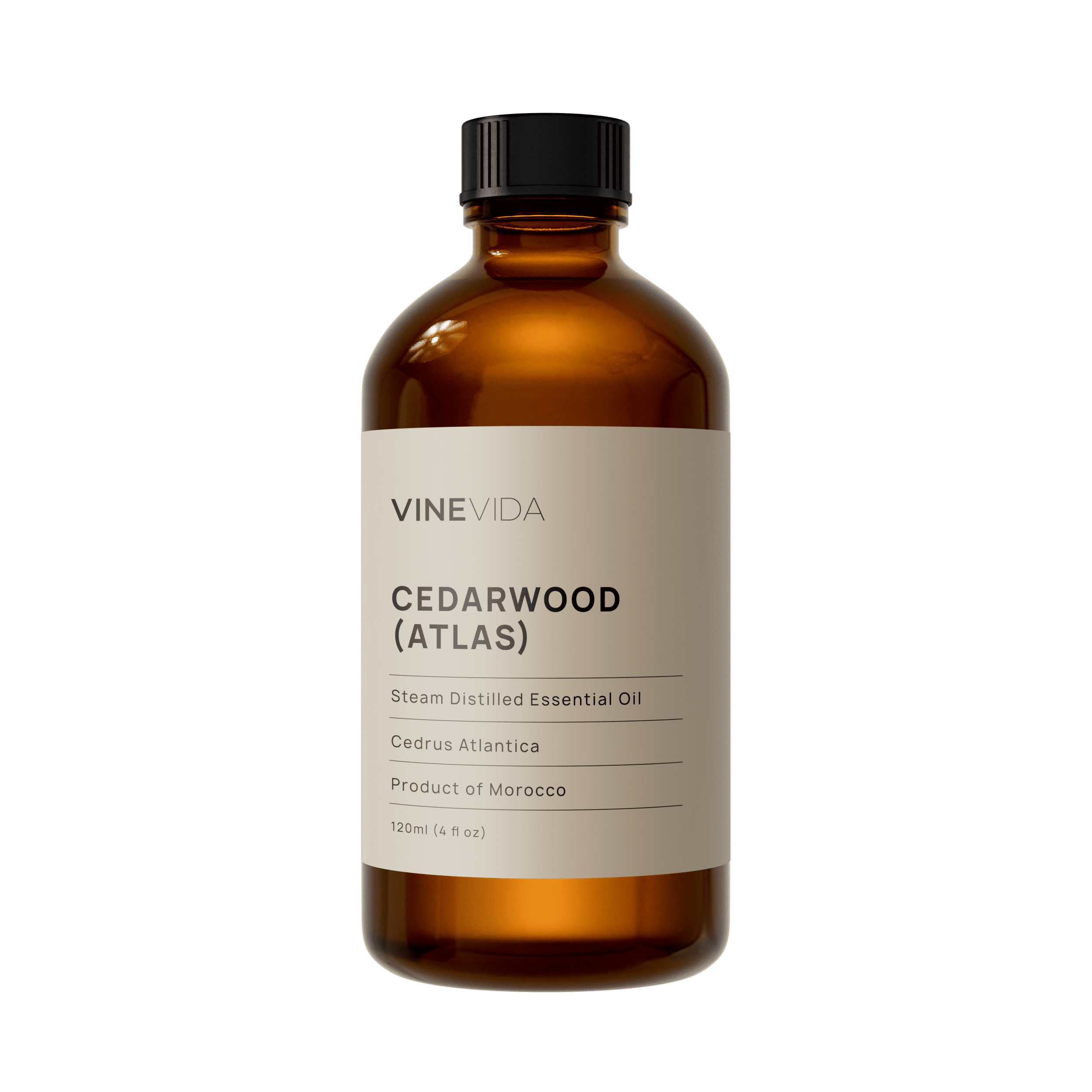
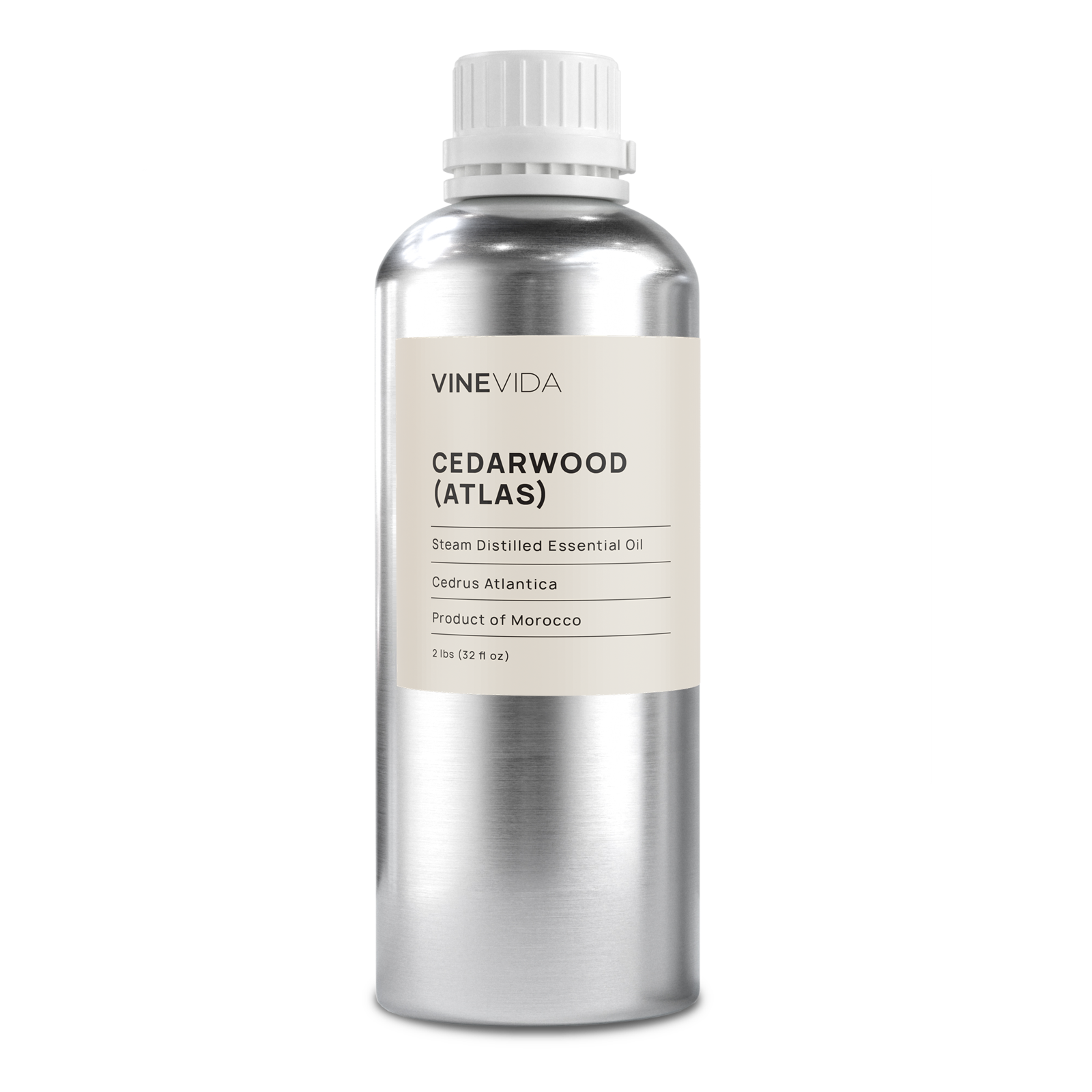
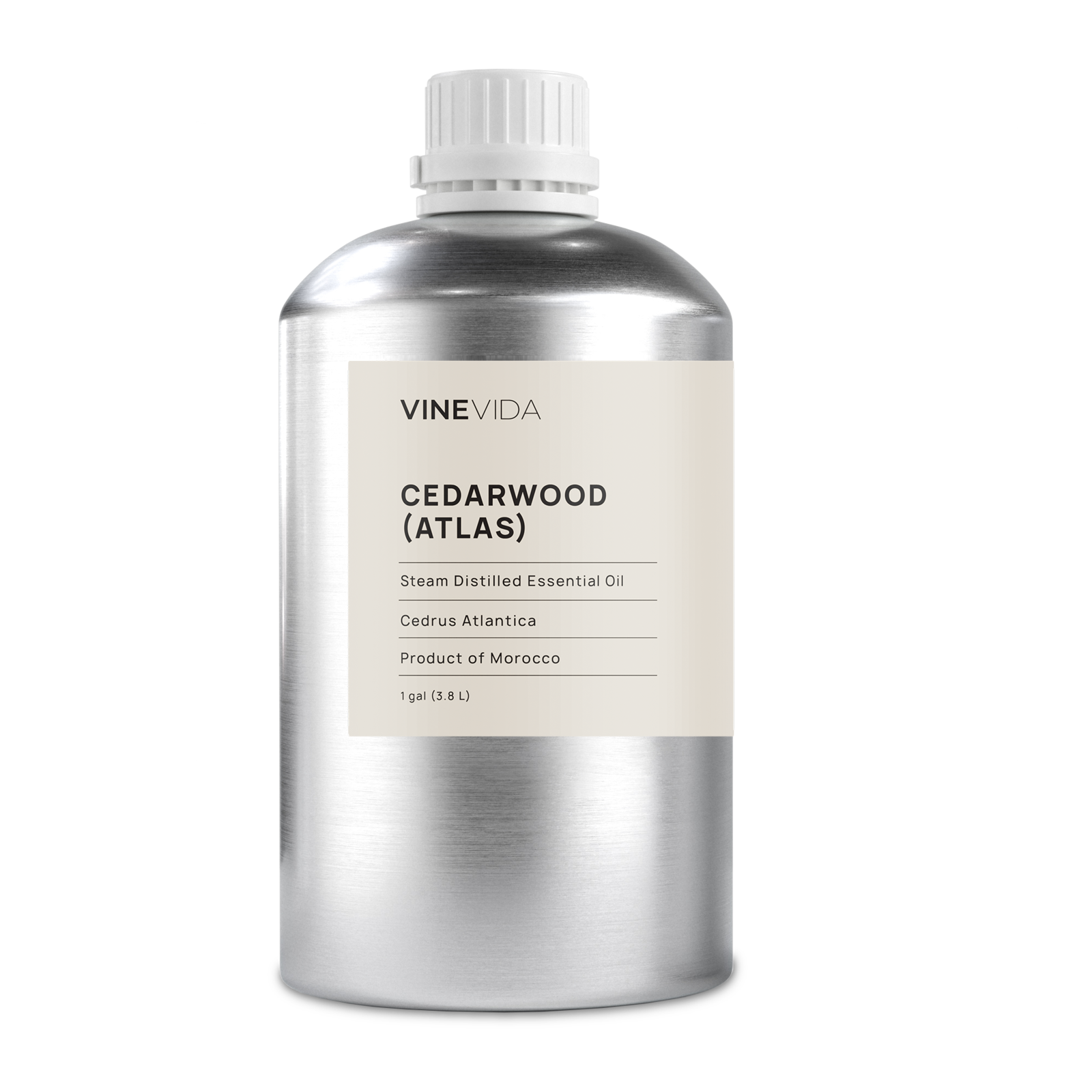
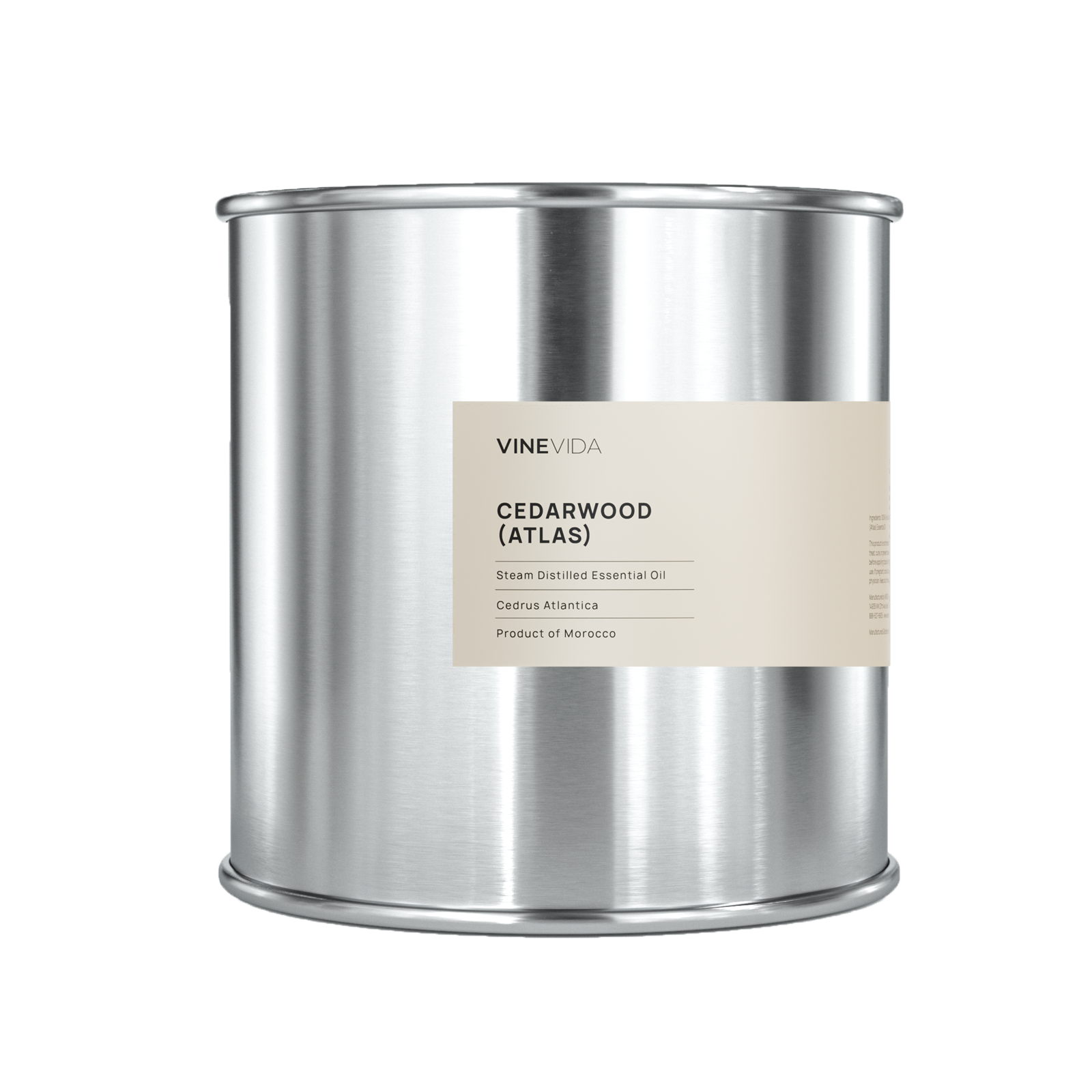
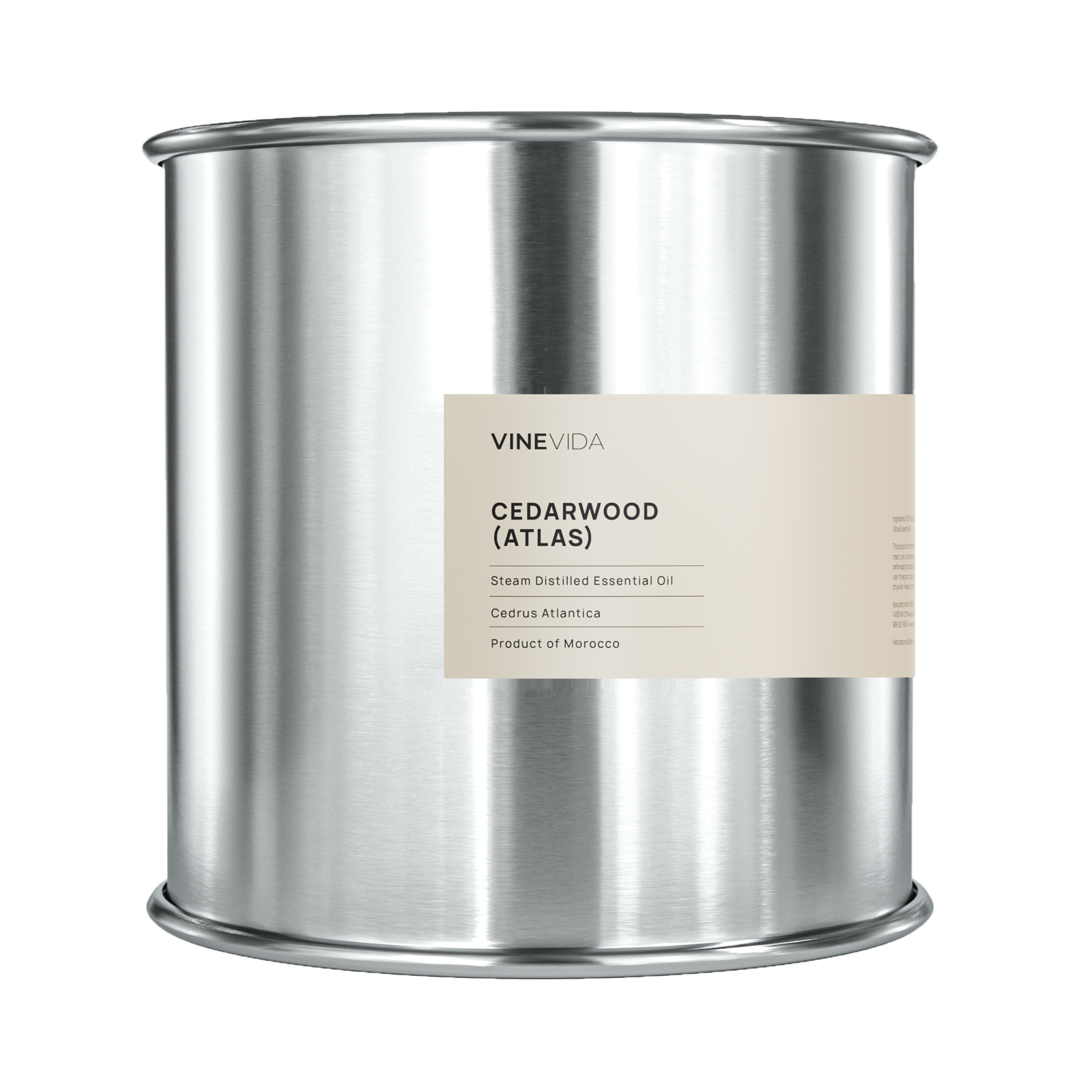
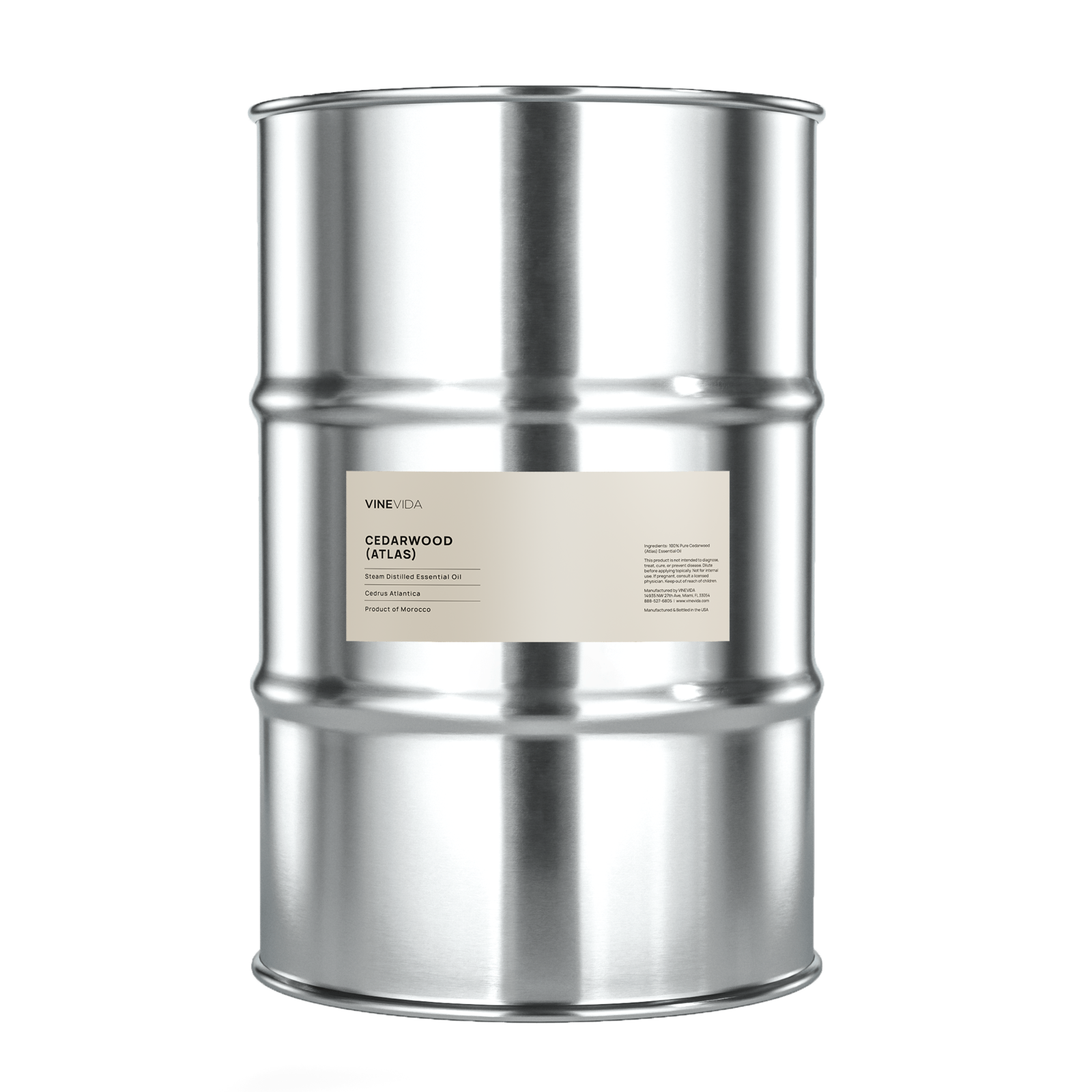




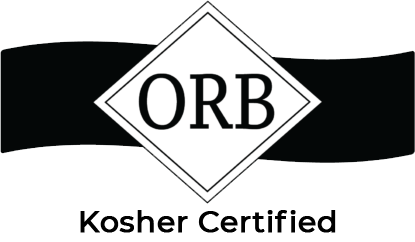
 Certificate of Analysis
Certificate of Analysis


















